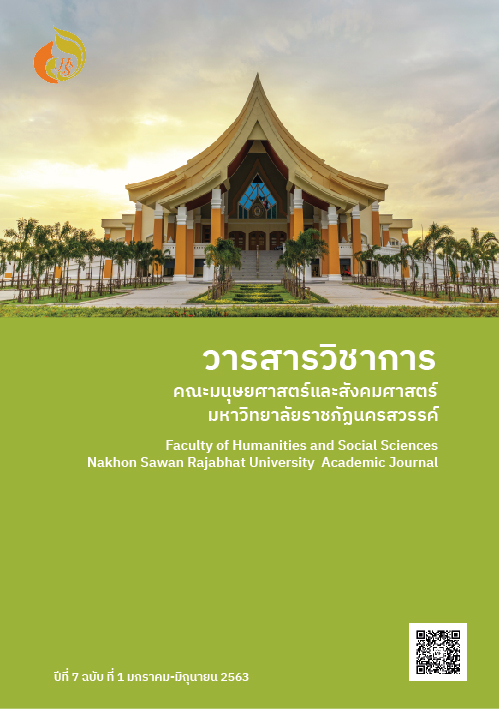The Happiness of life Based on Buddhism and Wisdom: a case study of the Chao Wat temple community, Chao Wat district, Ban Rai District, Uthai Thani Province
Main Article Content
Abstract
This research the objective is to study the elements and way of happiness. Knowledge and wisdom in ethics lead to real and sustainable well-being of villagers. Chao Wat temple community, Chao Wat Sub-district, Ban Rai District, Uthai Thani Province and Presenting the form of the way of happiness. The sample is divided into 2 groups: a group of 20 people and a number of group wisdom knowledge general population number of 30 people by using surveys and in-depth interviews (only for knowledge). The instrument used for data collection was a questionnaire and interviews with activist’s conversation (record). The statistics based on the data analysis, content analysis, and the percent of charge in conjunction with descriptive narration.
The results of the research were as follows: 1) The study of the composition and factors of the way of happiness of the villagers of Wat Chao Wat community, Chao Wat Sub-district, Ban Rai District, Uthai Thani Province Primary education level 4 the most 26% Occupation Farmers 72% The income is not more than 4,999 baht per month 50% Transport and communication, there is a main road, Lan Yang, Ban Rai - Lan Sak. The secondary line in the community of Bang Soi is also a gravel road. Communication part In the community there are telephone networks, various camps, TV and a community news distribution tower. (But not thoroughly) Overall environmental health care behavior has good waste management. Cleaning houses regularly And participation in community activities, 45 people, 90 percent. And the idioms to participate in the same activities, namely the cremation group, volunteer group and volunteer group, 15 people each, representing 30 percent. 2) Studying the knowledge and wisdom of villagers in the field of morality and ethics that bring true and lasting happiness. Most of the precepts are kept (temporary), giving, giving, sharing, forgiveness, which has honest occupational wisdom: making brooms, coconut stalks, pork stalks, fermented fish, traditional snacks, herbs, basket weaving, next to Brahma shirts. Share knowledge without cost.
Article Details
References
กรมส่งเสริมวัฒนธรรม กระทรวงวัฒนธรรม. (2559). วัฒนธรรม วิถีชีวิตและภูมิปัญญา. กรุงเทพฯ: รุ่งศิลป์การพิมพ์.
กรมสุขภาพจิตกระทรวงสาธารณสุข. (2552). แผนยุทธศาสตรกรมสุขภาพจิต ตามแผนพัฒนาเศรษฐกิจสังคมแห่งชาติฉบับที่ 10 (2550-2554). กรุงเทพฯ: บริษัทละมอมจำกัด.
กฤษณา วงษาสันต์ และคณะ. (2542). วิถีไทย. กรุงเทพฯ: เธิร์ดเวฟเอดดูเคชั่น.
ก้านทอง บุหร่า. (2560). องค์กรแห่งความสุข: แนวคิด กระบวนการ และบทบาทของนักบริหารทรัพยากรมนุษย์. วารสารวิทยบริการ มหาวิทยาลัยสงขลานครินทร์. 28(3), 169.
เกสร มุ้ยจีน. (2559). การสร้างความสุขด้วยจิตวิทยาเชิงบวก. วารสารวิทยาศาสตร์และเทคโนโลยี. 24(4), ปทุมธานี: คณะพยาบาลศาสตร์ มหาวิทยาลัยธรรมศาสตร์ ศูนย์รังสิต.
ธนภณ สมหวัง. (2543). พุทธธรรม : คู่มือมนุษย์ศตวรรษที่ 21. มติชนรายวัน. (11 มกราคม 2543).
ประคอง นิมมานเหมินท์. (2558). ประเพณีพิธีกรรมกับการเสริมสร้างความสุขชุมชน. รายงานการประชุมวิชาการระดับชาติ วิถีแห่งความสุขชุมชน. พิษณุโลก: มหาวิทยาลัยนเรศวร.
ประเวศ วะสี. (2530). ภูมิปัญญาและศักยภาพของชุมชน ปัญหาด้านวิกฤตสู่ทางรอด. กรุงเทพฯ: หมู่บ้าน.
พระครูธรรมธร (ครรชิต คุณวโร). (2556). การพัฒนาความสุขในพุทธธรรม. วารสารศึกษาศาสตร์. 15(1), 91.
พระธรรมปิฎก (ป.อ.ปยุตฺโต). (2539). การพัฒนาที่ยั่งยืน. พิมพ์ครั้งที่ 2. กรุงเทพฯ: มูลนิธิโกมลคีมทอง.
พระธรรมปิฎก (ป.อ.ปยุตฺโต). (2542). พุทธธรรม. กรุงเทพฯ: มหาจุฬาลงกรณราชวิทยาลัย.
พระพรหมคุณาภรณ์ (ป.อ.ปยุตโต). 2550(). ธรรมนูญชีวิต. พิมพ์ครั้งที่ 4. กรุงเทพฯ: สำนักงานพระพุทธศาสนาแห่งชาติ.
พระไพศาล วิสาโล. (2553). “รู้สติ” วิถีแห่งความสุขในสังคมที่คิดต่าง. นิตยสารหญิงไทย. 833(35).
พระมหาสุทิตย์ อาภากโร และเขมณัฎฐ อินทรสุวรรณ. (2553). ตัวชี้วัดความสุข: กลยุทธ์การสร้างและการใช้เพื่อชุมชนเป็นสุข. กรุงเทพฯ: สถาบันเสริมสร้างการเรียนรู้เพื่อชุมชนเป็นสุข.
พัชรินทร์ สิรสุนทร. (2547). แนวคิดและทฤษฎีด้านการพัฒนาสังคม. เอกสารประกอบการสอนสาขาวิชาพัฒนาสังคม คณะสังคมศาสตร์ มหาวิทยาลัยนเรศวร.
พัฒนา สุขประเสริฐ. (2558). ภูมิปัญญาท้องถิ่นกับการส่งเสริมการเกษตร. กรุงเทพฯ: ภาควิชาส่งเสริมและนิเทศศาสตร์เกษตร, คณะเกษตร, มหาวิทยาลัยเกษตรศาสตร์.
พุทธทาสภิกขุ. (2542). ความสุขสามระดับ. พิมพ์ครั้งที่ 2. กรุงเทพฯ: สุขภาพใจ.
โพสต์ทูเดย์. (2562). อันดับความสุขไทย ร่วงติดต่อกันปีที่ 2. สืบค้น 16 กรกฎาคม 2563, จาก https://www.posttoday.com/social/general/584071.
มหาจุฬาลงกรณราชวิทยาลัย. (2539). พระไตรปฎกภาษาไทย ฉบับมหาจุฬาลงกรณราชวิทยาลัย. กรุงเทพฯ: มหาจุฬาลงกรณราชวิทยาลัย.
รศรินทร์ เกรย์, วรชัย ทองไทย และเรวดี สุวรรณนพเก้า. (2553). ความสุขเป็นสากล. นครปฐม: สถาบันวิจัยประชากร และสังคม มหาวิทยาลัยมหิดล.
ราชบัณฑิตยสถาน. (2562). พจนานุกรม ฉบับราชบัณฑิตยสถาน พ.ศ. 2554. สืบค้น 18 มิถุนายน 2562, จาก http://www.royin.go.th/dictionary/.
วณี ปิ่นประทีบ และสุรณี พิพัฒน์โรจนกมล (บรรณาธิการ). (2548). เอกสารประกอบการประชุมสมัชชาสุขภาพแห่งชาติปี 2548 เรื่อง รวมตัวชี้วัดเกี่ยวกับความอยู่เย็นเป็นสุข. กรุงเทพฯ:สำนักงานปฏิรูประบบสุขภาพแห่งชาติ (สปรส.).
สมชาย ศักดาเวคีอิสร. (2562). การพัฒนาเครื่องชี้วัดความอยู่ดีมีสุข. สืบค้น 18 มิถุนายน 2562, จาก
www.jvkk.go.th/research/qrresearch.asp?code = 201440007341..
สุจิตรา อ่อนค้อม. ทรรศนะเรื่องความสุขในพุทธปรัชญา. (2561). วิทยานิพนธ์ บัณฑิตวิทยาลัย, จุฬาลงกรณ์มหาวิทยาลัย. สืบค้น 25 พฤศจิกายน 2561, จาก http://cuir.car.chula.ac.th/handle/123456789/19017.
สุภาคย์ อินทองคง. (2550). การใช้หลักพุทธธรรมนำการวิจัยและพัฒนาตามปรัชญาเศรษฐกิจพอเพียงสู่สุขภาพองค์รวม. ม.ป.ท.: ศูนย์เรียนรู้ชุมชนภาคใต้ (ศรช.).
สุภางค์ จันทวานิช. (2554). วิธีการวิจัยเชิงคุณภาพ. พิมพ์ครั้งที่ 19. กรุงเทพฯ: จุฬาลงกรณ์มหาวิทยาลัย.
สุริยัญ ชูช่วย. (2545). การแสวงหาความสุขและคุณค่าของชีวิต กรณีศึกษาทัศนะกลุ่มคนต่างวัยในกรุงเทพมหานคร (วิทยานิพนธ์มหาบัณฑิต). นครปฐม: มหาวิทยาลัยมหิดล.
อุทัยวรรณ ภู่เทศ. (2561). การจัดการความรูภูมิปัญญาทองถิ่นด้านการประกอบอาชีพของตำบลทับกฤช อำเภอชุมแสง จังหวัดนครสวรรค์. วารสารวิชาการคณะมนุษยศาสตร์และสังคมศาสตร์มหาวิทยาลัยราชภัฏนครสวรรค์. 5(1), 314.


